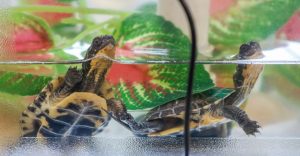(Radio Iowa) – There’s big excitement over tiny turtles in central Iowa. A new program pairs the Iowa D-N-R, Iowa State University and Des Moines’ Blank Park Zoo to raise what are known as Blanding’s turtles, a species native to Iowa that’s classified as globally endangered. Chris Eckles, the zoo’s chief engagement officer, says trained I-S-U students have tagged several turtles with radio transmitters and any pregnant turtles the students find are brought to the zoo. “We’ll then do an x-ray on the turtles to see how many eggs there are, and then we will induce her and have her lay her eggs here at the zoo,” Eckles says. “As soon as she’s done with that, we give the female back to the Iowa State student to take back to where they found that turtle — that’s really important to go back to where they know is home.”

Blank Park Zoo photo
Four pregnant turtles were recently found and their eggs were incubated, which produced a crop of 57 baby turtles. They’re all being cared for at the zoo, for now. “They have little containers that they’re in, like a little setup of water and food and all that sort of stuff, and they are marked so we know who came from what mother, so that we know when we put them back in the wild, we know that we’re going to put them back in the area where the female was found,” Eckles says. “So they have little markers on them, so we can identify who goes where.” The dozens of turtles will be set free next spring in the spots where their mothers were discovered. The turtles were about the size of a quarter when they hatched, and they’ll be about three to four inches in diameter when released.
“It was very exciting when they hatched. I think we were all just very giddy. It just feels good that we can have some success, knowing that hopefully we can add population back to Iowa, and hopefully get them back into a rebound situation and bring the populations back up,” Eckles says. “There’s a lot of bad news out there some days, and then this is one of those days where you feel really good about what we do and why we do it, and it makes our mission really matter.”
Releasing 57 turtles from four mothers is a big deal, Eckles says, as adults in the wild typically will only be able to raise one or two hatchlings to adulthood. Some of them may live as long as 70 years.








